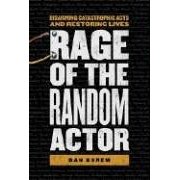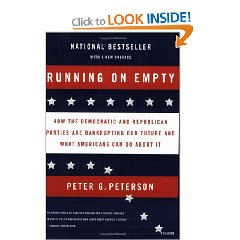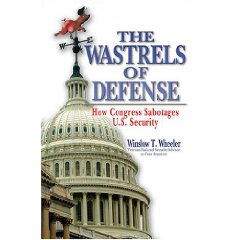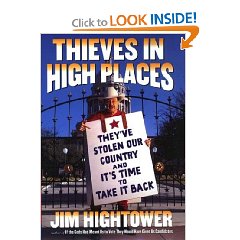Edit of 21 Dec 07 to add links.
The author has written a book that outlines an implementable vision worthy of the Nobel Prize.
If you buy just one book this year, if you read just one book prior to voting in the primary and general elections of any country, this is the book. It combines common sense, a deep understanding of the flaws of a capitalist system that has been hijacked by unethical elites, and an extraordinary diversity of interviews and sources that I found compellingly sensible and straight-forward.
Politically and economically, this book offers the citizen-voter-consumer-stockholder an objective and balanced account of exactly what is wrong with the existing American way of capitalism (both at home and abroad), and how we might, over time, fix it.
Most importantly, the author destroys all of the myths and lies about the rising American standard of living, and demonstates that when one revises the Gross Domestic Product calculations to substract rather than add the negative products such as prisons and health care stemming from unsafe products and practices, the over-all national economic indicators have been steadily declining for over thirty years.
The author is brilliant–truly brilliant–in studying the work of others and putting together a case for redefining capitalism and the financial accounting for capitalism to include social costs and benefits as part of the evaluative calculus. He excells at understanding and explaining the benefits to be had by introducing long-term sustainability, worker-friendly labor and management cultures, and balanced work force composition (save the middle class) and compensation (end the looting of America and its pension funds by an out of control corporate elite).
In discussing the soul of capitalism, the author is in fact discussing America's soul. His book is not only a handbook for grassroots and collective bargaining actions by all communities and assocations, it is a reference point by which Americans specifically, but all national in all nations, should be judging their political and economic and social leaders. People *can* take back the power, but first they must understand that the existing economic situation is so unstable and unhealthy that it virtually guarantees life on Earth will end within the next 100 years.
Although the book clearly mandates a reordering of both the American economic and the American political systems, and the author addresses those, he placed the bulk of his emphasis at the grass-roots level, and discusses how specific organizations and communities across America are “by-passing Washington” and establishing revolutionary new covenants for community-based, labor-friendly, sustainable economics.
The book as a whole draws a clear distinction between what one might call Bush Economics (loot the commonwealth, enrich a very tiny elite that already has most of the wealth) and Dean Economics (recover the $500 billion a year in unwarranted corporate subsidies and financial fraud, restore the social side of the capitalist value system, share the wealth, sustain the environment).
The author is a man of faith. Throughout the book, but especially when discussing the Social Gospel movement and reform theologians with close ties to extreme suffering in communities that have lost everything, he can inspire tears of both sadness at what we have done to ourselves, and joy at the possibilities for the future if we the people take back the power.
At every turn in the book one reads about the connection between capitalism and democracy–between corrupt capitalism and the falseness and injustice of American democracy and foreign policy (see our reviews of Paul Krugman's “The Great Unraveling”, Jonathan Schell, “The Unconquerable World”, and Mark Hertsgaard, “The Eagle's Shadow”)–and between moral capitalism and democracy restored.
Drawing on the work of David Ellerman, William Greider discusses the master-servant relationship between corporate employers and human employees, and concludes, as does Ellerman, that all of the injustices of capitalism are based on a legalized fraud. “The ‘fraud' is the economic pretense that people can be treated as things, as commodities or mahcines, as lifeless property that lacks the qualities inseparable from the human self, the person's active deliberation and choices, the personal accountability for one's actions.”
Three additional notes (this review barely scratches the surface and cannot do justice to the wealth of knowledge the author is communicating in a very effective manner):
1) If the labor unions come together to use their pension funds as sledge hammers, they can do a great deal of good in both reforming Wall Street and nurturing labor-friendly and environmental-friendly corporate behavior.
2) The retired population in America represents an untapped national asset–a wise President would find ways to use this virtually unlimited pool of social and functional talent to revitalize communities, schools, families, businesses, and non-profit endeavors.
3) Both the corporate governance model and the enforcement model are so severely flawed that they must be over-turned. Corporations should not have legal personalities that eliminate accountability for the individuals managing them, and the enforcement process needs to be turned on its head, focusing on incentives for higher social performance rather than punishments for the occasionally prosecuted rogue corporation.
In relation to foreign economic relations, the author provides a superb complementary reading to Clyde Prestowitz's book, “Rogue Nation: American Unilateralism and the Failure of Good Intentions.” As he puts it so nicely, in today's world walls do not work and there is no place for corporations to hide once the anger of the people is aroused. America must not only clean its own house, but in so doing, in restoring the morality of capitalism and the realiy of democracy, America will again be a land of ideals instead of hypocrisy, a land of liberty instead of looting, a land that inspires the world instead of corrupting it.
America, and the world, are at a turning point. I pray that no fewer than 50 million Americans will read this book, and I urge every faithful Amazon customer to buy 5 copies of this book and give them out as part of re-engaging every adult in the vital process of restoring democracy and restoring morality to capitalism.
High recommended books, with reviews:
The Battle for the Soul of Capitalism: How the Financial System Underminded Social Ideals, Damaged Trust in the Markets, Robbed Investors of Trillions – and What to Do About It
Blessed Unrest: How the Largest Movement in the World Came into Being and Why No One Saw It Coming
The Tao of Democracy: Using Co-Intelligence to Create a World That Works for All
Society's Breakthrough!: Releasing Essential Wisdom and Virtue in All the People
The Wealth of Networks: How Social Production Transforms Markets and Freedom
One from Many: VISA and the Rise of Chaordic Organization
A Power Governments Cannot Suppress











